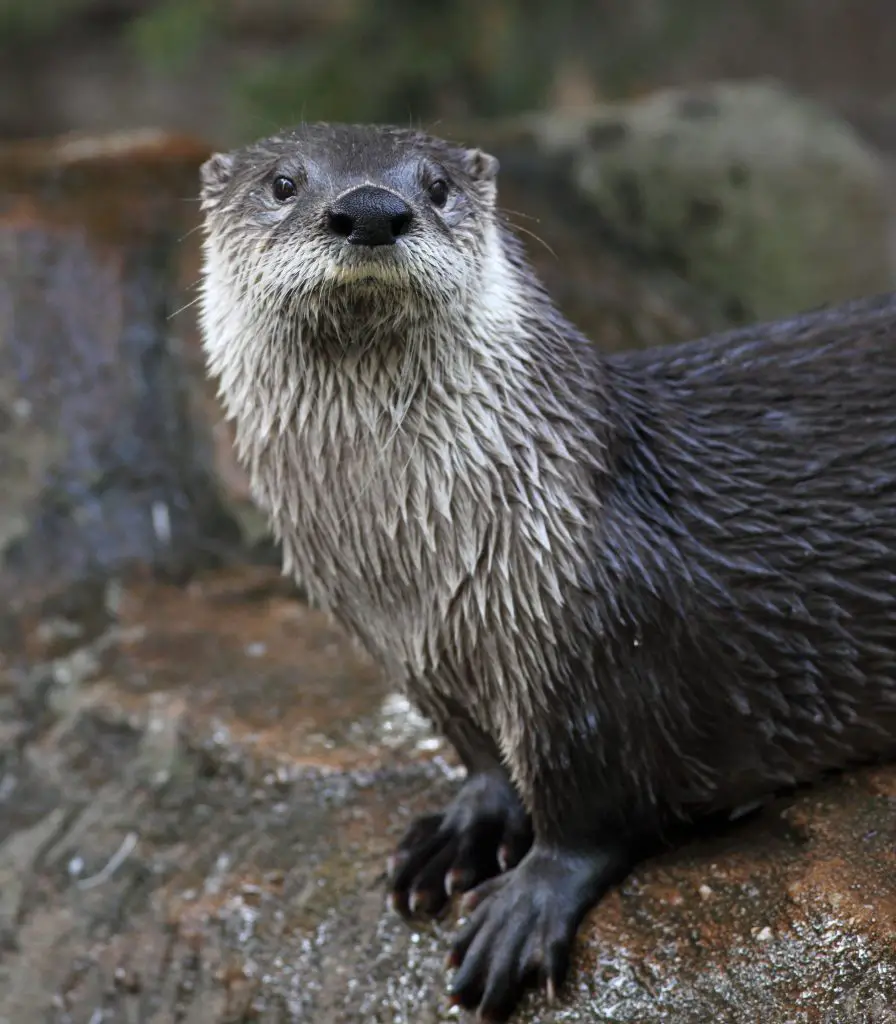Yes otters will attack humans – but it isn’t something that is very common. Recently it seems to be happening more and more in Florida – where habitat conflict is higher.

Will River Otters Attack Humans?
North American River Otters (Lontra canadensis) by nature – try to avoid humans. They would prefer to choose habitats that are peaceful, clean, and out in the wilds. Who wouldn’t?
They range across the North American continent from the wilds of the Arctic tundra to the sandy shores of the Florida Keys and are also known as the common otter or northern otter depending on their location.
Living in small family groups or alone, they travel along and feed in, rivers, channels, lakes, and coastal areas for their favorite foods. Mainly eating fish, molluscs and crustaceans, these river otters stay hidden in the water or in their underground dens.
In most states, people would hardly know they were there – but in Florida in particular they are well-known. Often coming into close contact with humans through the extensive networks of channels, canals, and inlets – they have become somewhat habituated. With great weather, great habitats, and an almost perfect supply of fish – they have increased in numbers and become quite possessive of their home range.
In their natural habitat, river otters will only usually attack humans if they feel threatened: perhaps having pups or when injured. However, in Florida, they are taking to this overly offensive attitude along riverbanks across the whole state. There are reports of otter attacks in other states too, including California, but they are more defensive in nature.
According to records: in the last 130 years there have been 39 reported otter attacks – more than 50% of them have been in just the last 30 years. Of those attacks in the U.S. nearly 80% of them were from river otters – and just over a third of those were in Florida alone.
Will Sea Otters Attack Humans?
Just like river otters – Sea Otters (Enhydra lutris) have been known to attack humans. With their cute faces and adorable grooming routines, it is difficult to stop yourself from wanting to give them a cuddle!
Don’t.
Sea Otters are incredibly powerful and can certainly cause serious tissue damage to a human. They are from the carnivore family and so have sharp and powerful jaws – like a cat. Plus the fact that if they attack you in the water – they have a huge advantage.
Sea otters can also be over 1.5 meters long (nearly 5ft) and can weigh 100lbs (45kg) – heavier than the average German Shepherd – and a bite to match! Even on land they often catch people out when they try to grab a quick selfie. Usually quite laid back – they just want some peace and quiet to catch some shut-eye. Resting is hugely important to a Sea Otter – and disturbing them onshore could literally be putting their lives at risk out on the ocean.
It is recommended to stay at least 50 feet away from them at all times both in and out of the water. Ideally don’t swim towards them even from a distance as they will have to react – using valuable energy up. If they stop what they are doing and have a good look at you – you have disturbed them already – so back off.
Are Octopuses and Otters Equally Aggressive Toward Humans?
Octopuses’ aggression towards humans is virtually non-existent. These intelligent marine creatures are generally shy and prefer to avoid human interaction. On the other hand, otters rarely display aggression towards humans, except in rare circumstances such as feeling threatened or protecting their young. Overall, both octopuses and otters exhibit minimal aggression towards humans.
Can Otters Have Rabies?
All mammals can carry rabies – and with otters, it is definitely transmissible to humans. It is very rare for an otter to pass it to humans though (with bats, dogs, and raccoons being among the usual culprits). In the last 30 years, only 24 cases of rabid otters have been reported in Florida – although other states vary.
Rabies is a virus that is transmitted in bites and scratches (no matter how small) – so if you are ever in the water and are scratched or chewed by an otter – even if it was while they were being ‘friendly’ – you need to make sure you speak to a doctor and potentially get yourself a rabies inoculation as a prophylactic (preventative medication).
Signs that an animal might have rabies are mainly an increased likelihood of attacking people – so these go hand in hand.
Other signs include strange behavior; unusual and uncontrolled noises; staggering; staring; twitching; walking in circles, looking confused; or collapse. As with all wildlife – never handle sick otters without thick gloves – or better still – call a professional rehabber or wildlife professional instead.
Rabies can only be treated immediately after the skin is broken – so it is best to act fast. Once symptoms start it is too late to treat and is almost always incurable.











